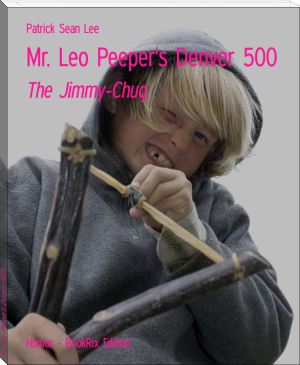The Head of Kay's by P. G. Wodehouse (romantic story to read .txt) 📗

- Author: P. G. Wodehouse
Book online «The Head of Kay's by P. G. Wodehouse (romantic story to read .txt) 📗». Author P. G. Wodehouse
"Yes. It—it is rather high, isn't it?" said Fenn. "Awful glare, too."
He picked up his chair and sat down well out of sight of the box. Had they seen him? he wondered. Then common sense returned to him. They could not possibly have seen him. Apart from any other reasons, he had only been in his brother's seat for half-a-dozen seconds. No. He was all right so far. But he would have to get back to the house, and at once. With three of the staff, including his own house-master, ranging the town, things were a trifle too warm for comfort. He wondered it had not occurred to him that, with a big attraction at the theatre, some of the staff might feel an inclination to visit it.
He did not stop to say goodbye to his brother. Descending from his perch, he hurried to the stage door.
"It's in the toobs that I feel it, sir." said the door-keeper, as he let him out, resuming their conversation as if they had only just parted. Fenn hurried off without waiting to hear more.
It was drizzling outside, and there was a fog. Not a "London particular", but quite thick enough to make it difficult to see where one was going. People and vehicles passed him, vague phantoms in the darkness. Occasionally the former collided with him. He began to wish he had not accepted his brother's invitation. The unexpected sight of the three masters had shaken his nerve. Till then only the romantic, adventurous side of the expedition had struck him. Now the risks began to loom larger in his mind. It was all very well, he felt, to think, as he had done, that he would be expelled if found out, but that all the same he would risk it. Detection then had seemed a remote contingency. With three masters in the offing it became at least a possibility. The melancholy case of Peter Brown seemed to him now to have a more personal significance for him.
Wrapped in these reflections, he lost his way.
He did not realise this for some time. It was borne in upon him when the road he was taking suddenly came to an abrupt end in a blank wall. Instead of being, as he had fancied, in the High Street, he must have branched off into some miserable blind alley.
More than ever he wished he had not come. Eckleton was not a town that took up a great deal of room on the map of England, but it made up for small dimensions by the eccentricity with which it had been laid out. On a dark and foggy night, to one who knew little of its geography, it was a perfect maze.
Fenn had wandered some way when the sound of someone whistling a popular music-hall song came to him through the gloom. He had never heard anything more agreeable.
"I say," he shouted at a venture, "can you tell me the way to the High Street?"
The whistler stopped in the middle of a bar, and presently Fenn saw a figure sidling towards him in what struck him as a particularly furtive manner.
"Wot's thet, gav'nor?"
"Can you tell me where the High Street is? I've lost my way."
The vague figure came closer.
"'Igh Street? Yus; yer go—"
A hand shot out, Fenn felt a sharp wrench in the region of his waistcoat, and a moment later the stranger had vanished into the fog with the prefect's watch and chain.
Fenn forgot his desire to return to the High Street. He forgot everything except that he wished to catch the fugitive, maltreat him, and retrieve his property. He tore in the direction whence came the patter of retreating foot-steps.
There were moments when he thought he had him, when he could hear the sound of his breathing. But the fog was against him. Just as he was almost on his man's heels, the fugitive turned sharply into a street which was moderately well lighted. Fenn turned after him. He had just time to recognise the street as his goal, the High Street, when somebody, walking unexpectedly out of the corner house, stood directly in his path. Fenn could not stop himself. He charged the man squarely, clutched him to save himself, and they fell in a heap on the pavement.
XVI — WHAT HAPPENED TO FENN
Fenn was up first. Many years' experience of being tackled at full speed on the football field had taught him how to fall. The stranger, whose football days, if he had ever had any, were long past, had gone down with a crash, and remained on the pavement, motionless. Fenn was conscious of an ignoble impulse to fly without stopping to chat about the matter. Then he was seized with a gruesome fear that he had injured the man seriously, which vanished when the stranger sat up. His first words were hardly of the sort that one would listen to from choice. His first printable expression, which did not escape him until he had been speaking some time, was in the nature of an official bulletin.
"You've broken my neck," said he.
Fenn renewed his apologies and explanations.
"Your watch!" cried the man in a high, cracked voice. "Don't stand there talking about your watch, but help me up. What do I care about your watch? Why don't you look where you are going to? Now then, now then, don't hoist me as if I were a hod of bricks. That's right. Now help me indoors, and go away."
Fenn supported him while he walked lamely into the house. He was relieved to find that there was nothing more the matter with him than a shaking and a few bruises.
"Door on the left," said the injured one.
Fenn led him down the passage and into a small sitting-room. The gas was lit, and as he turned it up he saw that the stranger was a man well advanced in years. He had grey hair that was almost white. His face was not a pleasant one. It was a mass of lines and wrinkles from which a physiognomist would have deduced uncomplimentary conclusions as to his character. Fenn had little skill in that way, but he felt that for some reason he disliked the man, whose eyes, which were small and extraordinarily bright, gave rather an eerie look to his face.
"Go away, go away," he kept repeating savagely from his post on the shabby sofa on which Fenn had deposited him.
"But are you all right? Can't I get you something?" asked the Eckletonian.
"Go away, go away," repeated the man.
Conversation on these lines could never be really attractive. Fenn turned to go. As he closed the door and began to feel his way along the dark passage, he heard the key turn in the lock behind him. The man could not, he felt, have been very badly hurt if he were able to get across the





Comments (0)